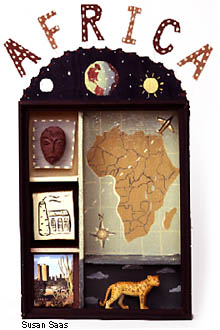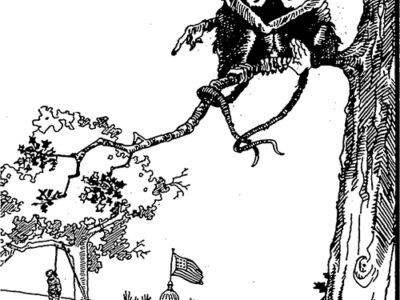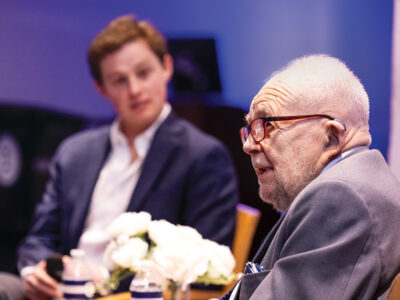
Dr. Patrick Cole, visiting professor of history, was musing about the influential African and African-American men who have taught or studied at the University — a roster that began with W.E.B. DuBois and has included the presidents of Nigeria and Ghana and the former prime minister of the Cote d’Ivoire. (Cole himself has been a candidate for the presidency of Nigeria, a member of its Federal Cabinet, and Nigeria’s ambassador to Brazil.)
“How did these great men end up at the University
of Pennsylvania?” he asked during a colloquium titled “Visions of
Independent Africa,” sponsored by Penn’s African Studies Center and a
consortium of University offices and departments. Perhaps, he speculated
in his richly-accented bass, it was a tradition of open-mindedness, or
perhaps it was “some irresistible force within the atmosphere” that
caused them to “pass through the portals of the University.”
It would be a mistake to suggest that Penn has always been a
thoroughly welcoming host, as Louis Massiah, the filmmaker whose
documentaries include W.E.B. DuBois: A Biography in Four Voices,
was quick to point out. While DuBois was hired in 1896 as an “assistant
in sociology,” both his title and his salary were less than his
experience and his credentials (which included a Ph.D. from Harvard
University) should have earned him. “The relationship between the
University and DuBois,” said Massiah, “is not one to be extraordinarily
proud of.”
DuBois spent the last years of his life in Ghana — now
celebrating its 40th anniversary as an independent nation — where he
was hosted by its first president, another Penn alumnus, Kwame Nkrumah, G’42, G’43. “Nkrumah
was able to honor DuBois in a way that we were not able to do in this
country,” said Massiah after his film was shown. “This is very, very
important, and something that we feel a great debt to Ghana for.”
Nkrumah’s son, Dr. Francis K. Nkrumah, is a pediatrician who
serves as director of the Nogouchi Memorial Institute for Medical
Research in Ghana and collaborates on sickle-cell-anemia research with
Dr. Kwaku Ohene-Frempong, associate professor of pediatrics at
Children’s Hospital of Philadelphia and director of the Sickle Cell
Center. The younger Nkrumah recalled with some amusement that one of his
father’s fellow graduate students at Penn once remarked that “no matter
what a paper was supposed to be on, Nkrumah twisted it around to write
on African freedom and the anti-colonial’s problem.” While “Africa must
unite!” was his father’s “vision and political battle cry,” said Nkrumah
fils, “it was also just that vision which ultimately brought about his downfall and destruction.”
Cole argued that the career of Nnamdi Azikiwe, C’33, Hon’80, the
first president of Nigeria, could be divided into two phases: as a
leader of the pan-African movement, and later “within the Nigerian
context,” where he got bogged down in the tribal politics that plague
the country even today.
“If indeed wishes were horses,” said Cole, “instead of having 54
countries in Africa today, you might only have one or two, and in those
circumstances one believes that the history of Africa would be totally
different.”
Alassane D. Ouattara, Gr’72, the former prime minister of
the Cote d’Ivoire who is now deputy managing director of the
International Monetary Fund, argued that “the development of a country
is not possible without the development of free-market initiatives.”
Unfortunately, those initiatives have often been accompanied by flagrant
corruption, which Ouattara called “the most difficult aspect of African
politics.”
But although it’s hard for people to accept austerity measures
“when they see leaders driving around in Mercedeses,” Ouattara said,
Africans today “are demanding more accountability” from their rulers,
giving him hope that the continent is moving in the right direction.
Even the teaching of literature takes on a visceral urgency in
Africa, as Dr. Robert Lucid, emeritus professor of English, indicated
when he talked about the South African writer and then-exile Dr. Ezekiel
Mphahlele, professor of English at Penn from 1974-77 and again from
1984-85. Lucid recalled a time when he was asked to host a group of
young literature teachers from African colleges. When they arrived at
Penn and found that Mphahlele was on the faculty, they insisted that
their return home be delayed in order to meet with him. The next
morning, they did.
“There they all stood, faces bathed in this extraordinary glow of
anticipation,” recalled Lucid. Mphahlele “stepped past me into the
room. As I backed out the door, I saw how they surged forward to
surround him, and how he laughed and spread his arms in greeting.
“It had been wrong of me to think that I knew our colleague,”
Lucid concluded. “He was not just a distinguished teacher and man of
letters. No. At that moment I could see that he was far, far more.
Ezekiel Mphahlele was an authentic hero.”




